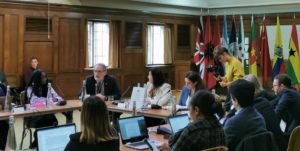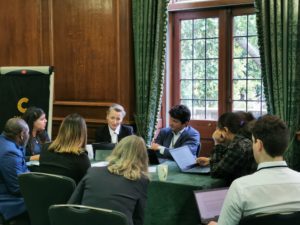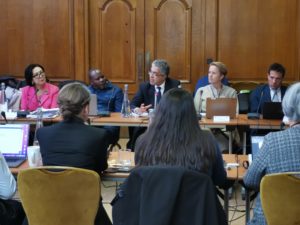On 27 and 28 September the UK Statistics Authority hosted the 27th meeting of the United Nations High Level Group for Partnership, Coordination and Capacity Building. Delegates from 15 countries came to London for the meeting, chaired by the National Statistician, Professor Sir Ian Diamond, whilst others joined remotely. The group was originally formed in 2015 ,by the United Nations Statistical Commission, and aims to establish a global partnership for sustainable development data.
The Group also plays a critical role in overseeing the planning for the World Data Forum and plans for the next Forum in China in April 2023 featured heavily in this year’s agenda. Other matters discussed included the implementation of the Cape Town Global Action Plan and plans for the Global Partnership for Sustainable Development Data’s next Datafest in 2023.
Alongside this, hosting this meeting allowed us to highlight the great work the Authority and ONS are doing. This included interest in our work on the Inclusive Data Charter and Data Science Accelerator.
Inclusive Data Charter
The Inclusive Data Charter (IDC) is series of principles that underpins the collection of data that ensure people regardless of their location, ethnicity, gender, or age are represented when data is collected. The five principles represented are:
· Principle 1: All populations must be included in the data
· Principle 2: All data should, wherever possible, be disaggregated in order to accurately describe all populations
· Principle 3: Data should be drawn from all available sources
· Principle 4: Those responsible for the collection of data and production of statistics must be accountable
· Principle 5: Human and technical capacity to collect, analyse, and use disaggregated data must be improved, including through adequate and sustainable financing
The ONS has been working in collaboration with the Global Partnership for Sustainable Development Data (GPSDD) and its global network to reaffirm our commitment for improved and strengthened data disaggregation. This work is underpinned by the Authority’s strategy, Statistics for the Public Good, which drives the mission of UK official statistics.
Data Science Accelerator
The Data Science Accelerator is a programme designed by the ONS Data Science Campus, in collaboration with the UN Big Data Task Team on Training, Competencies and Capacity Development. The project is a capacity building programme that gives analysts from other National Statistics Offices the opportunity to develop their data science skills.
The programme operates on a basis of building capacity by providing people with the opportunity to be mentored by data scientists. It takes place over 12 weeks and the mentee will spend one day a week working on a data science project with remote support offered by the mentor.
Both topics drew significant interest from the member countries in attendance and provided us with an excellent chance to work together to deliver shared action on the most pressing statistical challenges in support of the UK’s priorities and for the global good.
During the meeting, the Authority provided input into the review of the Sustainable Development Goal implementation process, the steps needed to better foster international collaboration, and whether there was a need for a strategic reorientation of the Cape Town Global Action Plan which the group feeds into. This has been all completed in advance of the UN World Data Forum in Hangzhou, China in April 2023.
 As part of the National Statistician’s attendance at the meeting we hosted Tianna, a member of International Day of the Girl, who was standing in for Professor Sir Ian as the UK National Statistician for the day, to highlight the importance of empowering girls to ensure equal gender participation in senior leadership roles in organisations.
As part of the National Statistician’s attendance at the meeting we hosted Tianna, a member of International Day of the Girl, who was standing in for Professor Sir Ian as the UK National Statistician for the day, to highlight the importance of empowering girls to ensure equal gender participation in senior leadership roles in organisations.
As part of the Authority’s international strategy, Statistics for the global good, we have continually sought opportunities to enhance the profile of the work of UK official statistics in international fora and build strong relationships with partner National Statistics Offices. We are very proud to have hosted such a successful meeting, which allowed us to both showcase the great work undertaken in UK official statistics and also show our international counterparts what London has to offer. In future, we look forward to seeing how the groups work progresses.
The work of the HLG-PCCB continues to be of vital importance for countries across the globe, in all continents. You can read more about the Group on the UN Statistics Division website.


